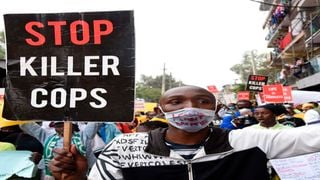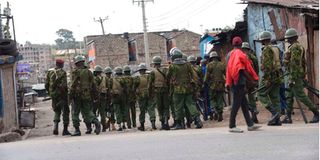
A man holds a placard during a protest against police killings and brutality in Mathare in June 2020.
| File | Nation Media GroupNews
Premium
In the slums, death squads and killer police live cheek by jowl
What you need to know:
- The Pangani Six are a special team of police officers mandated to hunt criminals in Pangani, Eastleigh and Mathare.
- According to Social Justice Centre’s Working Group, 54 youths have been killed extra-judicially in Mathare alone since the beginning of this year.
Everything happened so fast. Two men on a boda-boda drove quickly through several people waiting for matatus at the St Teresa’s stage in Eastleigh, Nairobi’s ‘Little Mogadishu’. As the motorbike split the crowd, the pillion passenger snatched the targeted phone and tried to escape.
And just as the woman screamed, plainclothes police officers, who were trailing the men – known phone snatchers in the area – managed to pull them off the motorcycle. But, unlike uniformed police, these ones had no intentions of taking the duo to court.
“They dispersed the crowd and dragged the man towards the back of Amana petrol station,” a tout who witnessed the events that took place on a Monday afternoon told the Nation.
“Then we heard two or three shots,” recalled the tout, “I didn’t bother to check if the man had been killed or not, because the crowd was too big, but I was told the Pangani Six had been looking for the guy.”
The Pangani Six are a special team of police officers mandated to hunt criminals in Pangani, Eastleigh and Mathare. The squad was formed at the height of the emergence of a vigilante group, Superpower, created by businessmen who wanted protection from intimidation by their rivals.
The Superpower gang had morphed into a quasi-terrorist group and when police started investigating its financiers, the businessmen pulled out, leaving the ruthless, broke and abandoned gang on its own.
The gangsters started surviving on extortion and armed crime. By 2016, when the Pangani Six squad was formed under the leadership of Corporal Ahmed Rashid, the Superpower gang had turned Eastleigh into a crime zone.
Rashid first came into the national limelight when a video was circulated on social media of him shooting a handcuffed, unarmed man in front of a mall in Eastleigh.
While the video sparked countrywide outrage, and the then Inspector-General of Police, Joseph Boinnet, promised to take action against “the officers involved” the Pangani Six squad went on with their business.
Pangani Six
“Those we profile, we have to get them alive or dead,” Rashid told the BBC in 2018, one year after the Eastleigh shooting.
Today, more than four years later, Rashid is still in charge of the Pangani Six. The extrajudicial killings linked to the squad have not only increased but the tactics used by the unit seem to have been replicated by police in almost every slum area where youth-led gun-toting or knife squads roam in the alleys.
Gaza, a criminal gang in the slums of Eastlands in Nairobi, was one of them. An offshoot of the Mungiki, Gaza grew to become the most fearsome group between 2013 and 2017. Its downfall came after its leader, Michael George Mwaniki (alias Super or Mwanii), began boasting online about murdering police officers.
Immediately after that, a 16-member special unit was formed to hunt down and kill the gang’s leaders. Today the gang, whose exploits rose to levels only witnessed during the Mungiki years, is a shell of its former self, with its control confined to Kayole, its last stand.
While human-rights groups have voiced concern about the surge of extrajudicial killings as the gangs and police collide, some residents of Nairobi slums support the police.
“I can say about 80 per cent of the people are with the police because of insecurity. The remaining 20 are probably parents and people shouting from their nice neighbourhoods out there about human rights,” Gloria Akinyi, a resident of Mwiki told us.
“If you live and feel what we go through, you will support the police for fighting crime,” she said.
According to the National Crime Research Centre (NCRC), Nairobi’s slums have routinely featured as the most dangerous places to live due to overcrowding, lack of resources and high rates of unemployment.
Our analysis of NCRC annual data for the last five years reveals that Kangemi, Kamae, Kariobangi, Korogocho, Kayole, Kosovo, Kibera, Mwiki, Kiamaiko, Mathare, Kawangware, Uthiru, Waithaka, Lungalunga, Mukuru, Mlango Kubwa, Huruma and Githurai are the most dangerous places to live.
Hunting down criminals
Out-manoeuvred by criminal gangs, and with a Judiciary that sets free the accused on bail as a right, the police have resorted to brutal force. While this cannot be officially acknowledged by the National Police Service, the existence of special squads responsible for hunting down criminals in slums is an open secret.
Unlike in middle-class and rich neighbourhoods where residents report crimes and they are booked in occurrence books, in order for investigations to start, crimes in slums are rarely reported unless someone is hurt. This is due to the deep mistrust between the police and residents.
Instead, police maintain a ‘black book’ of people perceived to be causing trouble in neighbourhoods. We were informed that once a suspected criminal’s name appears in the black book, his profile and photo are circulated among officers in that particular command. From then on he becomes a walking target.
The profiling of suspected criminals has made its way to the internet through amorphous characters believed to be police officers with the blessings of their bosses, using a Facebook page known as Nairobi Crime Free.

Police officers during an operation and youth throwing stones at a policeman in Mathare on May 16.
The mysterious administrators of the pages have obtained near-mythical status in the slums of Nairobi where the mention of their pseudonyms evokes fear. Almost all of the young people whose names and pictures have been posted on the page on allegations of crime have ended up dead.
“It is not like we just look for them and kill them, because if we don’t these are dangerous criminals and they will kill you,” an officer from the Dandora police post told us.
“We talk to them first and tell their parents too to advise them. Most of them are people who have been arrested before, taken to court and are out on bond robbing and killing,” the officer said.
Emmanuel Chaku was asleep with his pregnant wife in Mathare 4B when he heard a loud knock on his door. It was just before 10pm on May 21. Before the door could be opened, armed men kicked it in so hard that it crashed to the floor, hitting his wife in the process. They then stormed in and started beating up the couple.
“They handcuffed him and ordered him to walk out,” his wife Beatrice told us.
Extrajudicial killings
Outside, Chaku found a friend of his, Harrison Mumo, waiting under the guard of a separate group of men. They were both bundled into a Toyota Probox, registration number KCP 361V.
Chaku’s body was found at City Mortuary two days later, while Mumo lived to tell the tale only for him to be arrested a few days later in a similar manner in Mlango Kubwa, which neighbours Eastleigh. This time around, civil society groups piled pressure on the police to either release him and four others or take him to court. The uproar about Mumo’s arrest even caught the attention of Senior Counsel Paul Muite.
“I add my voice to those demanding that if Harrison Mumo is suspected of committing any crime, let him be charged in court,” tweeted Mr Muite. “I have no doubts that one day, those arrogantly executing people extrajudicially will be held to account; Chile style.”
Mumo was this month charged with robbery with violence. Those who know him and the late Chaku, however, say the two were not criminals. Chaku was a garbage collector who found himself on the wrong side of the target of police officers, while Mumo was the sole witness to Chaku’s murder.
“The truth is that there are those involved in crime,” Kennedy Chindi of the Social Justice Centre’s Working Group (SJCWG), an alliance of local organisations that documents police killings in informal settlements, told us.
“But even if someone is involved in crime and you have not caught him in the act, why can’t you arrest and take them to court?” he asked.
Under the Police Service Act, the use of lethal force is justified only when it is unavoidable and human life has to be protected.
“A police officer shall always attempt to use non-violent means first and force may only be employed when non-violent means are ineffective or without any promise of achieving the intended result,” the law says.
“The force used shall be proportional to the objective to be achieved, the seriousness of the offence, and the resistance of the person against whom it is used, and only to the extent necessary while adhering to the provisions of the law and the Standing Orders.”
Undocumented killings
Police officers argue that the people they shoot are armed criminals who either resist arrest or shoot at them when challenged to surrender. But not all cases fit this description.
On April 12, police, while collecting bribes from bars, arrived at Evelyn Onzere’s Patience Wines and Spirits shop near Kabete. Her son, Nicholas Lifede, was minding his own business when two officers from the Kabete Police Station arrived at the shop. They asked for Sh500, which her sister, who was running the shop, refused to give.
In anger, her sister took out her phone and started recording the officers. One of them slapped her, and Lifede waded into the argument, drawing a crowd that was nearby. One of the officers shot in the air and the other got hold of Lifede, according to witnesses.
“He was shouting at Nicholas, ‘Utajua mimi ni Baraza! (You will know I’m Baraza)’,” Onzere told the Nation.
Cornered by the crowd, the officers turned on Lifede, a mechanic, labelling him a bhang peddler. As one of the officers reached for handcuffs, Lifede struggled to break himself free and broke into a run. He was shot and died on the way to hospital.
After days of ignoring our questions on the circumstances of Lifede’s death, the Independent Policing Oversight Authority issued a public statement.
“Investigations are already underway, with the Authority having already taken some witness accounts and attended the postmortem examination,” the statement read in part.
Since most killings go undocumented, it is difficult to know how many young people are killed by police in slums in similar style. According to SJCWG, 54 youths have been killed extrajudicially in Mathare alone since the beginning of this year and about 20 in Dandora and Kayole.
The Nation could not independently verify these numbers, but according to Missing Voices, a group of organisations that maintains a database of extrajudicial killings,166 people were killed last year by law enforcement officers.





